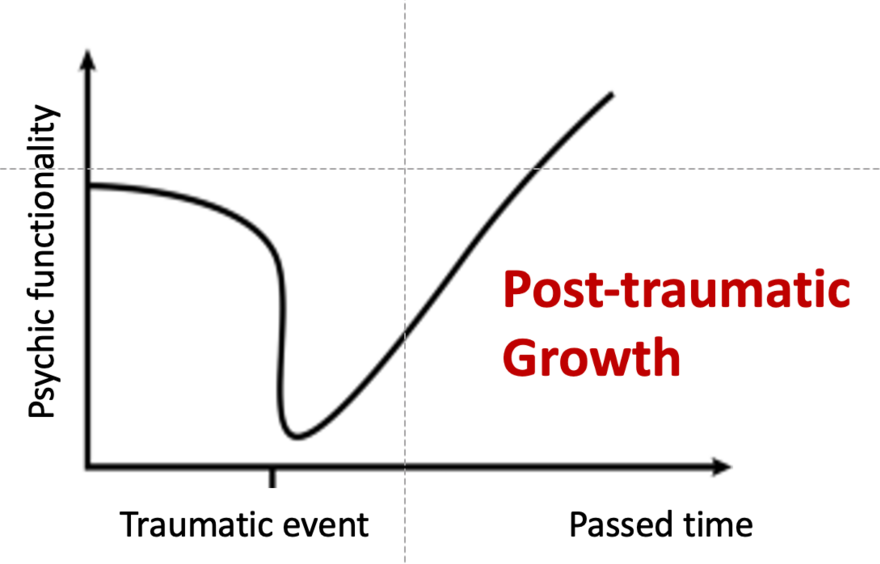Posttraumatic Growth: Spiritual - Emotional - Physical

Trauma therapy and post-traumatic growth
The term "post-traumatic growth" was coined by Richard G. Tedeschi and Lawrence G. Calhoun [1], who have studied it both theoretically and empirically. It indicates that victims not only recover from trauma, but that it may present an opportunity for personal growth.
Although paradoxical that gain can come precisely from loss, there are numerous reports that traumatic life events can act as catalysts for post-traumatic growth.
What are the main factors that support post-traumatic growth?
An international comparative study by J. Mangelsdorf and M. Eid [2] showed that people who managed to create moments of positive emotionality despite the critical experiences they went through, had supportive social relationships, and were able to make sense out of what they experienced afterward were more likely to exhibit posttraumatic growth, thereby identifying the following 3 factors:
- the presence of positive emotions
- social support
- the establishment of sense from what is went through
These factors also provide a central guide in therapeutic treatment to support post-traumatic growth.
Which principle is the most important for therapeutic work supporting post-traumatic growth?
Most trauma therapeutic methods aim to reduce trauma-associated symptoms and integrate and cope with what has gone through the experience. This approach is also the basis for promoting post-traumatic growth.
However, growth cannot occur until the acute breakdown of psychological functionality is overcome. Therefore, targeted therapeutic work for post-traumatic growth should begin only after the acute phase of adjustment has been overcome.
That is why choosing the right time is of particular importance. The components mentioned above come in as important guideposts: The presence of supportive relationships, positive emotions, and finding meaning in what one has gone through.
Are there other factors for post-traumatic growth? We think so!
Still, research on post-traumatic growth is in its infancy. Thus, most findings on what supports people in emerging stronger from potentially traumatic events relate to cross-sectional studies and thus can only be seen as initial idea generators.
In the Eurythmy4you Trauma Conference 2023, therefore, in addition to the three guiding factors mentioned above, we will devote ourselves to a fourth principle to which we attach a high degree of importance. The body. It is a memory store for the pain suffered, but it also forms the ground on which growth takes place.
How to specifically promote positive emotions and finding meaning in overcoming trauma, you will learn in the lectures of the doctors, psychiatrists and psychotherapists of the Eurythmy4you Trauma Conference. What role the body can play in this process, what potentials for post-traumatic growth are bent in it, you can experience in your own body in the many body-therapeutic workshops.
Eurythmy4you Trauma Conference
Trauma therapy and post-traumatic growth
Theory, first aid and complementary therapy
[1] Richard G. Tedeschi, Lawrence G. Calhoun: Trauma and transformation: Growing in the aftermath of suffering. Sage Publications, Newbury Park 1995.
[2] Judith Mangelsdorf, Michael Eid (2015). What makes a thriver? Unifying the concepts of posttraumatic and postecstatic growth. Frontiers in Psychology, 6, 1–17. Full Article

2 comments
Thank you Theodor ,
It is so strengthening and encouraging to read your email on the 1st day of the New Year! To read about post traumatic growth , like a flower blooming is so heart warming . I
I am going to join the conference , for me , to help others , for the good in the world . W
Warm greetings ,
Juliett Elgrably 🌟🌹🌟
Hello Dr. Hundhammer,
Thank you for your lovely article on post traumatic growth! I am actually presenting a poster on PTG at the upcoming APA conference, and wanted to ask if I could use the picture under the title on my poster?
Thank you and please let me know what your thoughts are!
Best,
Grace Kim
Leave a comment